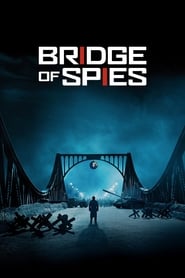
Video Sources 1890 Views

Synopsis
Bridge of Spies 2015 full Movie Download In Hindi English Dual Audio 720p and 480p
StoryLine:
In 1957 New York City, Rudolf Abel is arrested and charged with spying for the Soviet Union. Insurance lawyer James B. Donovan is appointed to defend Abel, so that Abel’s trial will be seen as fair. Committed to the principle that the accused deserves a vigorous defense, he mounts the best defense of Abel he can, declining along the way to cooperate in the CIA‘s attempts to induce him to violate the confidentiality of his communications with his client. Bridge of Spies 2015
Abel is convicted, but Donovan convinces the judge to spare Abel the death penalty because Abel had been serving his country honorably, and he might prove useful for a future prisoner exchange; Abel is sentenced to 30 years. Donovan appeals the conviction to the Supreme Court based on the lack of a search warrant for the seizure of Abel’s ciphers and photography equipment. For his principled stand Donovan and his family are harassed, including shots being fired at their home. The conviction is upheld.
In 1960, Gary Powers, a pilot in the CIA‘s top secret U-2 spy plane program, is shot down over the USSR. He is captured and sentenced in a show trial to ten years confinement, including three years in prison.
Donovan receives a letter from East Germany, purportedly sent by Abel’s wife, thanking him and urging him to get in contact with their lawyer, whose name is Vogel. The CIA think this is a back-channel message hinting that the USSR is willing to swap Powers for Abel. They unofficially ask Donovan to go to Berlin to negotiate the exchange; he arrives just as the Berlin Wall is going up. Crossing in to East Berlin, he meets with a KGB officer in the Soviet Embassy and is then directed to Vogel, who represents the Attorney General of the German Democratic Republic (GDR) (East Germany).
Additional Links:
Original title
Bridge of Spies
IMDb Rating
7.6 290,090 votes
TMDb Rating
7.2 5,418 votes
Director
Director
Cast
James B. Donovan
Rudolf Abel
Mary Donovan
Thomas Watters Jr.
Wolfgang Vogel
Francis Gary Powers
Doug Forrester
Reporter
Chief Justice Earl Warren
William Tompkins



























